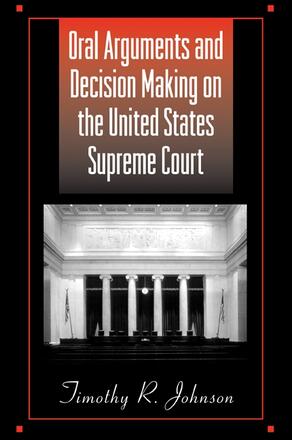
Oral Arguments and Decision Making on the United States Supreme Court
How oral arguments influence the decisions of Supreme Court justices.
Description
Timothy R. Johnson focuses on an all-too-often ignored aspect of the Supreme Court's decision-making process by providing a systematic explanation of how justices use oral arguments to make substantive legal and policy decisions. Using the arguments filed to the Court in legal briefs, oral argument transcripts, notes taken by Justice Lewis F. Powell during oral arguments, conference notes and internal memos of justices, and Court opinions, the book analyzes justices' behavior during these proceedings. The result is an impressive account demonstrating that justices use oral arguments to gather information regarding legal and policy options in a case, the preferences of competing political institutions and actors, and institutional rules that might affect the choices they make.
Timothy R. Johnson is Morse Alumni Distinguished Teaching Professor of Political Science at the University of Minnesota at Twin Cities. He is the coauthor (with Christopher P. Gilbert, David A. M. Peterson, and Paul A. Djupe) of Religious Institutions and Minor Parties in the United States.
Reviews
"Johnson has presented an interesting thesis and has admirably backed it up with data so that a reader does come away from the book with an understanding of the importance of oral arguments before the Supreme Court … It is an important addition to Supreme Court literature. " — American Politics
"Those who are interested in understanding the strategic politics of the Court will find much of interest in Johnson's excellent book. It sheds new light on an understudied feature of the Court and provides the kinds of insights that will surely inspire further research on how the institutional structure of the Court's decision making affects the substance of its policies. " — Law & Politics
"Johnson addresses an important question that has unfortunately received little scholarly attention, doing so in a creative and engaging manner. It is rare to see a fluid combination of qualitative and quantitative analysis in a single work. " — Scott A. Comparato, author of Amici Curiae and Strategic Behavior in State Supreme Courts
"This is an important study that impressively melds anecdotal evidence with more systematic evaluations of the data. Johnson creatively addresses the difficulties of measuring the impact of oral arguments, something many thought impossible. Any study that paves a new path and investigates a new topic will frequently be cited, but this book has the added benefit of being excellent. " — Richard L. Pacelle Jr. , author of Between Law and Politics: The Solicitor General and the Structuring of Race, Gender, and Reproductive Rights Litigation